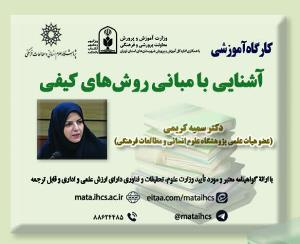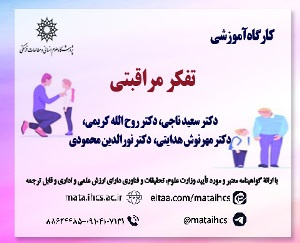اثربخشی آموزش هوش هیجانی بر مسئولیت پذیری و مهارت های مقابله ای مربیان پیش دبستانی (مقاله علمی وزارت علوم)
درجه علمی: نشریه علمی (وزارت علوم)
آرشیو
چکیده
پژوهش حاضر، با هدف بررسی اثربخشی آموزش هوش هیجانی بر مسئولیت پذیری و مهارت های مقابله ای مربیان پیش دبستانی انجام شد. روش پژوهش بر اساس هدف، کاربردی و براساس گردآوری داده ها، نیمه آزمایشی با طرح پیش آزمون- پس آزمون و گروه گواه بود. جامعه آماری شامل مربیان پیش دبستانی شهرستان ایذه در سال 1399 می باشد. از بین جامعه هدف، 30 نفر با روش نمونه گیری تصادفی انتخاب و در دو گروه آزمایشی (15) و گواه (15) گمارده شدند. ابتدا از هر دو گروه پیش آزمون به عمل آمد. گروه آزمایشی در 10 جلسه 45 دقیقه ای در طول دو ماه، آموزش هوش هیجانی را دریافت کردند. ابزارهای مورد استفاده در پیش آزمون و پس آزمون شامل مقیاس مسئولیت پذیری گاف و سیاهه مقابله با موقعیت های استرس زای اندلر و پارکر بود. جهت تجزیه و تحلیل داده ها از تحلیل کوواریانس چندمتغیری استفاده شد. یافته ها نشان داد آموزش هوش هیجانی موجب افزایش مسئولیت پذیری (001/0>p، 20/20=F) و مهارت های مقابله ای مساله مدار (003/0>p، 25/11=F) و کاهش مهارت های مقابله ای هیجان مدار (001/0>p، 75/14=F) و اجتنابی (004/0>p، 07/5=F) گروه آزمایشی در مقایسه با گروه گواه شده است. بر مبنای یافته های حاصل می توان گفت آموزش هوش هیجانی بر مسئولیت پذیری و مهارت های مقابله ای مربیان پیش دبستانی تأثیر معناداری داشته است. لذا پیشنهاد می شود از آموزش هوش هیجانی برای بهبود مسئولیت پذیری و مهارت های مقابله ای مربیان پیش دبستانی استفاده شود..The Effectiveness of Emotional Intelligence Training on Preschool Teachers' Responsibility and Coping Skills
Introduction Emotional intelligence refers to the differences between individuals in identifying motivation, emotions, and feelings, and controlling emotions, both in the individual and in social relationships. In fact, emotional Intelligence is the ability to process information related to one's emotions and the ability to use the information as a guide for understanding and acting. (MacCann et al., 2020). According to Bar-On (2003), emotional intelligence and teaching this skill deals with oneself, others, and the environment. Therefore, it should be more adaptive to changing conditions and be more successful in meeting environmental demands. Responsibility in the educational situation is broad in scope and guarantees health indicators and improved quality of life of children in school. In addition, recently, scientific interest in the problems of stress and coping with it has been increasing. Therefore, the purpose of this study was to investigate the effectiveness of emotional intelligence training for preschool teachers on their responsibility and coping skills. Method The research method is applied based on purpose and based on data collection, quasi-experimental with pre-test-post-test design and control group. The statistical population includes preschool teachers in Izeh City in 2020. From the target population, 30 people were selected by random sampling method and assigned to experimental (15) and control (15) groups. First, pre-tests were performed for both groups. The experimental group received emotional intelligence training in 10 sessions of 45 minutes over two months. The instruments used in the pre-test and post-test include the Responsibility subscale of the California Psychological Inventory and the Coping Inventory for Stressful Situations. Data were analyzed using the analysis of covariance by SPSS-23 software. Results The results obtained by comparing the post-test of independence variables in the two groups by controlling the effect of the pre-test, after emotional intelligence training showed the scores of responsibility and Task-oriented coping who participated in the experimental group compared to those in the control group Were significantly increased (P <0.01). The results also showed that the scores of the components of emotion-oriented coping and avoidant-oriented coping who participated in the experimental group, compared to those who were replaced in the control group decreased (P ≤.01). In general results showed that emotional intelligence training has a significant effect on the responsibility (F=20.20, p<0.0001) and coping skills (included: Task-oriented coping: F=11.25, p<0.003; Emotion-oriented coping: F=14.75, p<0.001; Avoidant-oriented coping: F=5.07, p<0.004) of preschool teachers. Conclusion Therefore, it can be concluded that emotional intelligence training is an effective method to increase preschool teachers’ responsibility and positive coping skills by using techniques such as familiarity with the concept of emotion, emotional awareness, identifying emotions, accepting emotions, confronting emotions, and personal responsibility skills. Also, emotional intelligence training because it emphasizes both cognitive and emotional factors, affects preschool teacher’s responsibility and coping skills.







